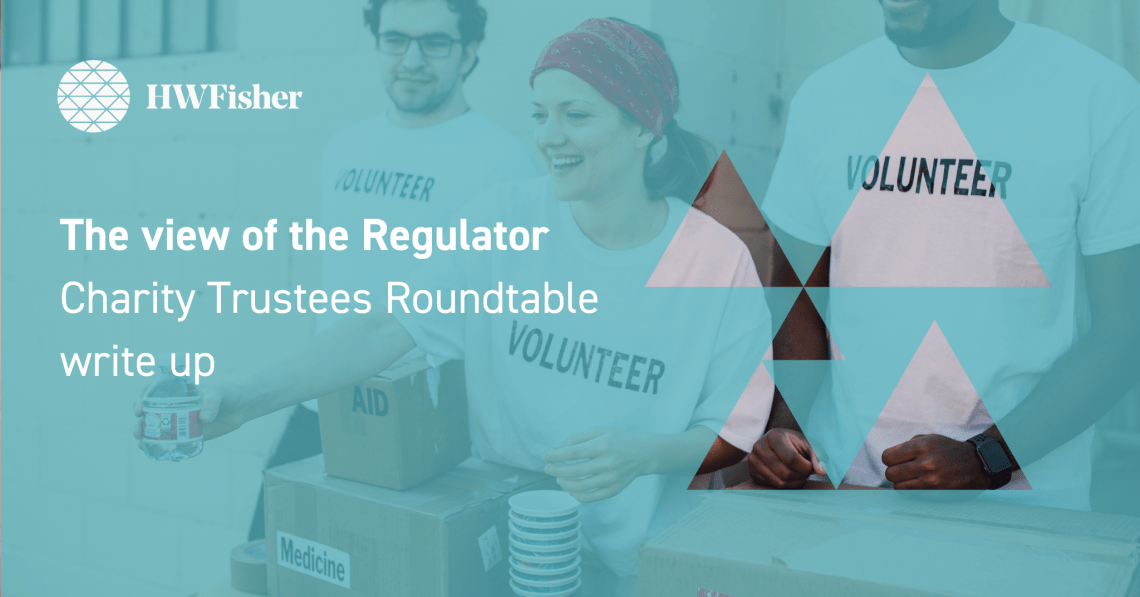
We were delighted to be joined by Will Lifford, Board Member at the Charity Commission, at our recent Charity Trustee Roundtable where the group discussion was focussed on the matters currently on the mind of the regulator. A summary of the discussion is set out below.
After the pandemic, the sense of getting back to normal was swept away by other issues; supply chain shortages, world food shortages with the Ukraine war, and the huge rise in inflation.So where there should have been light at the end of the tunnel, there are now many difficulties ahead.
What does this mean for charities? There’s going to be more demand for the kind of help and services they provide. There’s also going to be a decrease in donations. People are finding it harder to give to charities given the amount of their disposable income. And with more people working remotely it’s difficult to organise corporate fundraising initiatives. We’re also going to see some belt tightening in government over the coming months which may have an impact on the support that charities expect to get.
At the Charity Commission, the concern is to have a good understanding of what the current series of problems are going to mean for charities.
Alongside the rise in energy and supply costs, there is also the cost of labour. This has resulted in accelerating the need for software, so upgrades to systems, reporting tools and cash management tools; this is stretching resources but is absolutely required.
There are also hard decisions required around staff turnover, and for specific vacancy, flexible terms are often now necessary to recruit quality staff.
If you’ve got a reserve position that is a little bit fragile, there is a need to be doing some careful scenario planning. So, if that funding is cut by 30%, what expenditure would you cut? ? Robust planning is required with strategies to address different scenarios with regular monitoring.
Trustees needs to understand when and what is a serious incident and report that promptly so that the Charity Commission can help them to address the incident. A serious incident includes an adverse effect which results in a significant harm to whoever come into contact with a charity through the work that it does. Its significance is taking account of the nature and scale of the Charity’s operations.
What are some of the categories of reportable incidents? A serious incident could be where some harm or injury has occurred to someone under the charity’s care, possibly through negligence, or a significant financial crime including cyber crime. There are several charities which cause concern because of their possible links to extremism, terrorism, or money laundering. If you think insolvency is an issue, that is something which should be report to the Charity Commission immediately.
The Charity Commission website gives useful guidance on the types of things that should be reported.
What obligations do trustees have and what are the Charity Commission expecting you to report on? There’s very little that’s specific at the moment. There are requirements on gender pay reporting for a charity with more than 250 employees and on energy and carbon reporting for large companies. So, is that sufficient or do we need to do more?
The view of the Charity Commission is that there is a need to have more ESG reporting. There currently isn’t a specific policy on this and it will be considered as the SORP is revised. The requirements have to be proportionate in terms of the size of the charity, to encourage charities to report more transparently. The Charity Commission must take the size of charities into the account since a vast majority of charities in the UK are very small.
It is in your charity’s own interest to address the issues that your stakeholders would find helpful to know about in the trustees’ annual report. There may will be some requirements coming in under legislation for very big charities but that will only impact a small number overall.
In 2020, the Office for National Statistics reported that 25% of charities had suffered cybercrime. The statistics also show that 51% of high-income charities have suffered a cyber breach or attack. Very often charities are relying on volunteers who may not be very IT experienced. Also, more people are working remotely and the IT security around remote working isn’t as robust as it should be.
So have a really good look about your IT security. You may want to consider a separate piece of assurance over your cyber protection policies and procedures, and more generally around fraud; or consider a fractional CIO if you can’t afford, or you don’t need, a full time CIO.
You can have the best systems in place, technologically speaking, but it needs to be continually discussed internally to keep it high on the agenda, thinking when, not if, fraud or cybercrime will happen to us? How well prepared and how alert are we?
If you’d like to discuss any of the above areas in more detail, please contact Carol Rudge.
We’d love to hear from you. To book an appointment or to find out more about our services: